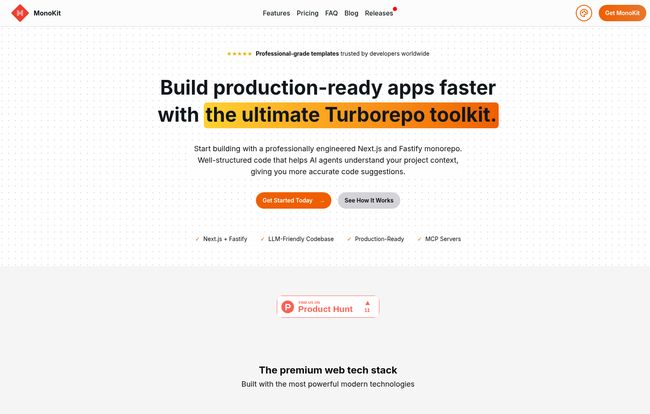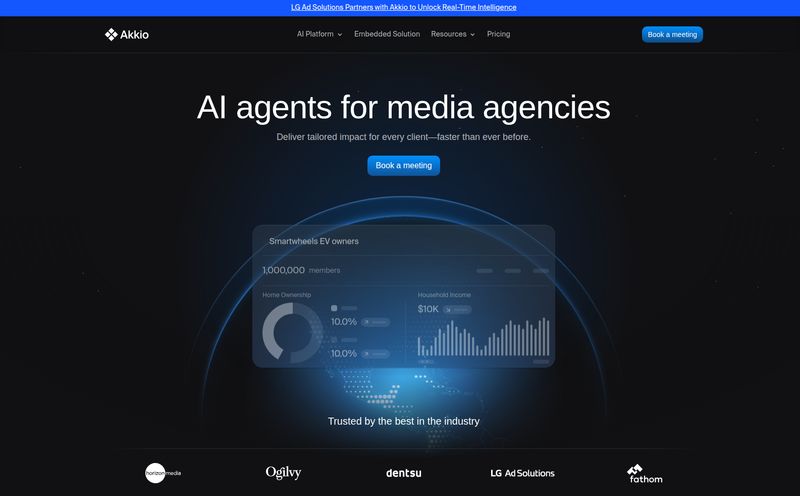How many times have you had a brilliant idea for a web app, only to feel your soul slowly drain away as you stare at a blank terminal window? The setup. Oh, the setup. Configuring TypeScript, wrangling ESLint and Prettier, picking a UI library, wiring up authentication, setting up payments... it's a mountain of work before you even write a single line of code for your actual idea. I call it “yak shaving,” and I’ve lost more weekends to it than I care to admit.
I’ve been in the SEO and dev game for years, and the one constant is that time is your most valuable asset. The faster you can ship, the faster you can learn, iterate, and start getting traffic. So when I stumbled across a tool called MonoKit, which claims to handle all that tedious groundwork for you, my cynical-developer-spidey-sense started tingling. A production-ready Next.js and Turborepo toolkit that saves weeks of development? Okay, you have my attention.

Visit MonoKit
What Exactly is MonoKit Anyway?
Think of MonoKit as a professional-grade chassis for your next web application. Instead of sourcing the engine, transmission, and electrical system yourself and trying to bolt them all together, MonoKit gives you a high-performance, pre-assembled foundation. You just get to focus on the fun stuff: the design, the features, the things that make your app unique.
At its core, MonoKit is an AI-powered monorepo toolkit built on a super modern tech stack. It combines Next.js on the frontend (a huge win for SEO, by the way) with Fastify on the backend, all managed within a Turborepo. If some of those names are just buzzwords to you, just know this: it’s built for speed, performance, and a smooth developer experience. It’s like the creators looked at the last five projects I built and decided to package up all the best parts.
The Features That Actually Matter
A features list can be a bit of an eye-glaze-inducer. So instead of just listing them, let's talk about what they mean for you, the person who just wants to build something cool without pulling your hair out.
A Foundation Built for Speed (and SEO)
As an SEO guy, the first thing I look at is the tech. Using Next.js is a massive green flag. Its server-side rendering (SSR) and static site generation (SSG) capabilities are gold for getting your pages indexed and ranked by Google. MonoKit doesn't just use Next.js, it comes with a pre-configured blog and SEO best practices built in. That means proper meta tags, sitemaps, and a structure that search engines love, right out of the box. Combine that with Turborepo for lightning-fast builds in your CI/CD pipeline, and you've got a recipe for a site that's both fast for users and friendly to crawlers.
Skipping the Boring Stuff: UI, Auth, and Emails
This is where I audibly sighed with relief. MonoKit comes packed with over 50 production-ready UI components. They’re accessible, customizable, and save you from the agony of building a date-picker from scratch. It also includes a multi-auth strategy, handling sign-ups, logins, and even magic links. And transactional emails? You know, the password resets, the welcome messages? It’s all there, with beautiful React Email templates ready to go. This isn't just a time-saver; it’s a sanity-saver.
The AI and "LLM-Friendly" Promise
Here’s where things get really interesting. MonoKit advertises itself as an "AI-powered" toolkit. Part of that is the inclusion of ready-to-use AI components for things like chat and embeddings. But the more subtle, and perhaps more powerful, feature is its "LLM-friendly" repository structure. The code is so clean and well-organized that AI coding assistants like GitHub Copilot can more easily understand the context of your entire project. This means more accurate, more helpful code suggestions. It’s a genuinely forward-thinking feature that acknowledges how we're all starting to code.
Let's Talk Money: The MonoKit Pricing Structure
Alright, this is the part everyone secretly scrolls down to first. So, what’s the damage? The good news is that MonoKit is a one-time purchase, not another subscription bleeding your bank account dry every month. I find that incredibly refreshing. They offer three tiers.
| Plan | Price (One-Time) | Who It's For | Key Features |
|---|---|---|---|
| Startup | $149 | For startups and small businesses | The core Turborepo boilerplate, SEO/Blog, Payments, AI components, Email templates, S3 Storage, and Discord access. |
| Scale | $299 | For growing businesses that need more support | Everything in Startup, plus full GitHub repo access and priority support. |
| Enterprise | $999 | For large organizations with custom needs | Everything in Scale, plus personal integration support to get you up and running. |
Honestly, the Startup plan at $149 feels like a steal. If you value your time at all, you'll burn through more than $149 worth of your own hours doing this setup manually. The Scale plan makes sense if you want to keep up with their latest updates directly from the source. The Enterprise plan is for big teams that can’t afford any downtime and need that white-glove setup.
The Good, The Bad, and The Codebase
No tool is perfect, and a good review has to be balanced. After digging through the docs and looking at what's on offer, here's my take.
What I Really Like
The biggest pro is the sheer velocity it gives you. You're not starting from zero; you're starting on lap two with a fine-tuned machine. The choice of a modern, respected tech stack is a huge plus, as it ensures you're not building on a crumbling foundation. The one-time cost is, frankly, fantastic. It's a single investment for a massive head start. For a solo founder or a small team, this could easily be teh difference between launching in one month versus three.
Potential Sticking Points
First off, it's not free. If your budget is zero, then this isn't for you. But as I said, you pay for it one way or another—with money or with time. If you're not familiar with the Next.js/Turborepo ecosystem, there might be a bit of a learning curve. It’s a professional toolkit, and it assumes a certain level of professional knowledge. Finally, some features like direct GitHub repo access are locked behind the more expensive plans, which is a pretty standard business model but something to be aware of.
Frequently Asked Questions about MonoKit
- What is MonoKit in simple terms?
- It's a pre-built starter kit, or boilerplate, for creating modern web applications. It gives you all the foundational code for things like user accounts, payments, and design, so you can focus on building your app's unique features.
- Is MonoKit a recurring subscription?
- Nope! It’s a one-time purchase. You buy the plan that fits you, and you get the code and features associated with it. This is a major advantage over many other developer tools.
- What technology does MonoKit use?
- It uses a modern stack including Next.js for the frontend, Fastify for the backend, TypeScript for type safety, Prisma for the database ORM, and Turborepo to manage the monorepo structure.
- Is MonoKit good for SEO?
- Yes, very. It's built with Next.js, which is excellent for SEO due to its server-side rendering capabilities. It also comes with a pre-configured blog and other SEO best practices to help you rank faster.
- Can I customize MonoKit after I buy it?
- Absolutely. That's the whole point. You get the entire codebase. You can change, add, or remove anything you want. It's your code to build upon.
- Is MonoKit only for experienced developers?
- While a beginner could learn a lot from the well-structured code, it's primarily aimed at developers who have some experience and understand the value of skipping the initial setup phase. A basic understanding of React and JavaScript is probably needed to get the most out of it.
So, Is MonoKit Worth The Investment?
In my opinion? A resounding yes. But with a condition: it's for people who value their time. If you're a student trying to learn the nuts and bolts of setting up a project from scratch, then you should probably do it the hard way. The struggle is part of the lesson.
But if you're a founder, a freelancer, or part of a team where speed is critical, MonoKit is an incredible accelerator. It’s not just a tool; it’s a strategic decision to trade a reasonable one-time fee for weeks of your life back. It lets you focus on finding product-market fit instead of fighting with a webpack config. And in this business, that's everything.



